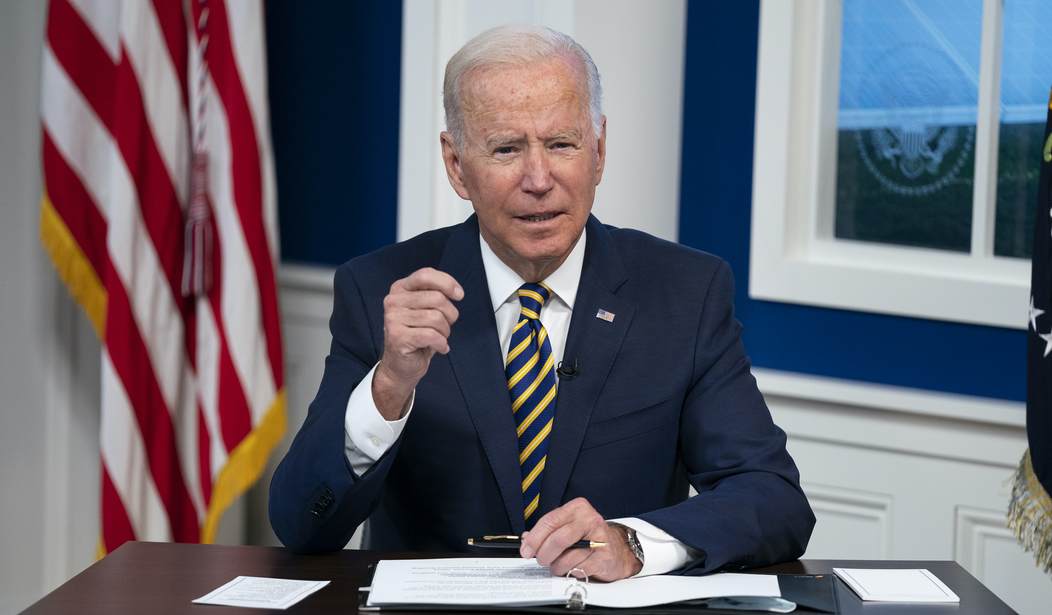Just how much did Joe Biden want the bipartisan infrastructure bill, anyway? After House progressives delayed it for months — in part with Biden’s connivance in linking it to his much larger reconciliation bill — Nancy Pelosi finally freed the BIF hostage last week. Democrats immediately hailed it as a major victory, and as an antidote for the humiliating election losses three days earlier.
Yet three days later, Biden still hasn’t signed it. “Where’s the BIF?” the New York Post asks, evoking Clara Peller in more ways than one:
After pressing Congress to urgently pass the bipartisan infrastructure bill last week, President Biden is now holding up the Senate- and House-passed legislation — until he can gather key members of Congress for a bill-signing photo op.
During Monday’s White House daily press briefing, deputy press secretary Karine Jean-Pierre was asked why Biden has not yet signed the bill after the White House and president “talked about the urgency” of passing it.
“So he talked about this on Saturday — he and he basically said he wants to make sure that the congressional members who work very, very hard on this when they come back, then we’ll — we’ll figure out a time to sign it,” Jean-Pierre told reporters.
“But you’re right, is it — it’s urgent, but we also want to make sure that the people who spent the last couple of weeks, last couple of months just all in delivering on this — on this promise are here for the signing as well,” she added.
When pressed on a specific date, Jean-Pierre said she does not have a date set but “it will be very soon.”
If it’s urgent, why is Biden waiting around until at least November 15 for a photo op? That seems an even more pertinent question with Democrats hoping to get a BIF bounce, as the Washington Post reports, even though their election humiliation had little to do with infrastructure policy. Biden even plans to go on tour to promote its benefits … while delaying its implementation:
The White House and congressional Democrats are preparing an aggressive sales campaign to promote the roughly $1 trillion infrastructure package soon to become law, an effort they hope will begin to counter the serious political problems exposed by last week’s elections.
But some Democrats worry that voters — including those who broke from the party in Virginia and New Jersey — are often mobilized by divisive cultural issues concerning race and identity. That makes the upcoming stretch a critical test of whether President Biden’s core political strategy of delivering tangible benefits still resonates in a powerfully polarized environment.
Democratic lawmakers are already holding events back home this week, touting smoother train commutes and other benefits of the infrastructure bill they hope voters notice in coming months. Cabinet secretaries are being dispatched to talk up the measure, while campaign operations are attacking Republicans who opposed it.
Biden will kick off an infrastructure sales tour Wednesday at the Port of Baltimore, outlining how the measure will upgrade ports and help ease supply-chain disruptions that are preventing consumers from purchasing toys, electronics and other goods. He will also participate in a virtual town hall in conjunction with the Democratic National Committee on Tuesday to promote the infrastructure bill, and on Monday he sat down for an interview with Local 12 in Cincinnati, where he was asked what the measure means for the perennially dilapidated Brent Spence Bridge that connects the city to northern Kentucky.
Isn’t that putting the cart before the horse? If the BIF does all these wonderful things for the supply chain and the economy, one would think that implementation would take priority over public relations and politicking.
The excuse of holding a photo op for the signing is nonsense. If that’s what the White House wanted, Biden could have asked the key figures in the House and Senate to stick around an extra day for a signing ceremony. He could have asked them to fly back for a Monday ceremony at the White House, too, or the fake White House over in the EOB. But why would a signing ceremony take priority over actually spending the money and cheering up voters, at least initially?
One has to wonder whether Biden’s playing a hostage game with BIF himself. The CBO will likely have some sort of scoring ready for the $1.75-ish trillion reconciliation bill (Build Back Better or BBB) at or around November 15, or possibly before. If the scoring turns out badly or isn’t ready yet, Biden could tell House moderates that he will refuse to sign the bill unless they pass his BBB first.
That could set up a pocket veto situation — maybe. Presidents have ten days to sign a bill after official presentment, excluding Sundays. If Congress officially presented Biden with the BIF on Monday, that would give him until Friday, November 19 to act on it. Since Congress adjourned in the intervening time, it’s possible that Biden could essentially execute a pocket veto by simply refusing to act on it, although their return into session might make that a moot point. If that didn’t work, then it would mean that the bill would become law without Biden’s signature, which would make this pre-victory lap a bit embarrassing.
But perhaps I’m giving Biden too much credit. Maybe he really does want to leave the impression that the BIF isn’t urgently needed and that most of its value is in the photo op. And who knows? Given the larding up of that bill to get it through Congress on a bipartisan basis, perhaps that’s a defensible argument.








Join the conversation as a VIP Member